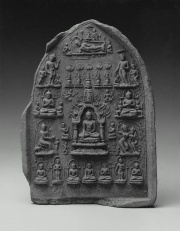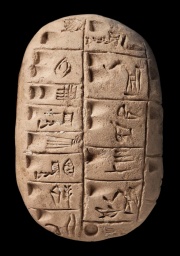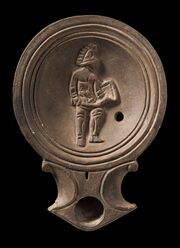Difference between revisions of "Terracotta"
(username removed) |
|||
| (2 intermediate revisions by 2 users not shown) | |||
| Line 1: | Line 1: | ||
| − | [[File:1976.62-E4196.jpg|thumb|]] | + | [[File:1976.62-E4196.jpg|thumb|Votive tablet<br>MFA# 1976.62]] |
== Description == | == Description == | ||
| − | + | [[File:2001.745-SC78761.jpg|thumb|Near Eastern tablet <br>MFA# 2001.745]] | |
Baked or semi-fired clay that is usally a mixture of clay, grog, and water. Terracotta is molded or shaped, dried for several days then fired to at least 600 C. Some terracottas are glazed prior to firing. It shrinks approximately 7 to 11% during drying and firing. Terracotta has been used for pottery, statuettes, lamps, roof tiles, and cornices since ancient times. As it is fireproof and lighter weight than stone, it became popular for building facades and ornamental elements in the mid-1800s. Terracotta has been used as veneer cladding over concrete, as spandrels, mullions, and cornices. Early 20th century facades were often glazed in white or cream colors. After World War II, terracotta was replaced by ceramic, glass and metal in building construction. | Baked or semi-fired clay that is usally a mixture of clay, grog, and water. Terracotta is molded or shaped, dried for several days then fired to at least 600 C. Some terracottas are glazed prior to firing. It shrinks approximately 7 to 11% during drying and firing. Terracotta has been used for pottery, statuettes, lamps, roof tiles, and cornices since ancient times. As it is fireproof and lighter weight than stone, it became popular for building facades and ornamental elements in the mid-1800s. Terracotta has been used as veneer cladding over concrete, as spandrels, mullions, and cornices. Early 20th century facades were often glazed in white or cream colors. After World War II, terracotta was replaced by ceramic, glass and metal in building construction. | ||
| − | [[File: | + | [[File:49.407-SC51137.jpg||thumb|Terracotta lamp<br>MFA# 49.407]] |
== Synonyms and Related Terms == | == Synonyms and Related Terms == | ||
terracotta (AAT preferred spelling); terra-cotta; terra cotta; terracota (Esp., Port.); terre cuite (Fr.); baked earth; Coade stone | terracotta (AAT preferred spelling); terra-cotta; terra cotta; terracota (Esp., Port.); terre cuite (Fr.); baked earth; Coade stone | ||
| − | == | + | ==Resources and Citations== |
| − | |||
| − | |||
| − | |||
| − | |||
| − | |||
| − | |||
| − | |||
| − | |||
| + | * Deborah Slaton, Harry Hunderman, "Terra Cotta", in ''Twentieth-Century Building Materials'', T. Jester (ed.), McGraw-Hill: New York, 1995. | ||
| − | + | * C.A.Galvin "Terracotta" ''The Dictionary of Art'', Grove's Dictionaries Inc., New York, 1996. | |
| − | * | + | * R. J. Gettens, G.L. Stout, ''Painting Materials, A Short Encyclopaedia'', Dover Publications, New York, 1966 |
| − | * | + | * G.S.Brady, ''Materials Handbook'', McGraw-Hill Book Co., New York, 1971 Comment: p. 805 |
| − | * | + | * Ralph Mayer, ''A Dictionary of Art Terms and Techniques'', Harper and Row Publishers, New York, 1969 (also 1945 printing) |
* ''Dictionary of Building Preservation'', Ward Bucher, ed., John Wiley & Sons, Inc., New York City, 1996 | * ''Dictionary of Building Preservation'', Ward Bucher, ed., John Wiley & Sons, Inc., New York City, 1996 | ||
| − | * | + | * Thomas C. Jester (ed.), ''Twentieth-Century Building Materials'', McGraw-Hill Companies, Washington DC, 1995 |
| − | * ''Encyclopedia Britannica'', http://www.britannica.com Comment: "terra-cotta" | + | * ''Encyclopedia Britannica'', http://www.britannica.com Comment: "terra-cotta" Encyclopædia Britannica [Accessed November 7, 2001]. |
* Art and Architecture Thesaurus Online, http://www.getty.edu/research/tools/vocabulary/aat/, J. Paul Getty Trust, Los Angeles, 2000 Comment: terracotta (preferred) | * Art and Architecture Thesaurus Online, http://www.getty.edu/research/tools/vocabulary/aat/, J. Paul Getty Trust, Los Angeles, 2000 Comment: terracotta (preferred) | ||
| Line 38: | Line 31: | ||
* ''The Dictionary of Art'', Grove's Dictionaries Inc., New York, 1996 | * ''The Dictionary of Art'', Grove's Dictionaries Inc., New York, 1996 | ||
| − | * | + | * Tom Rowland, Noel Riley, ''A-Z Guide to Cleaning, Conserving and Repairing Antiques'', Constable and Co., Ltd., London, 1981 |
[[Category:Materials database]] | [[Category:Materials database]] | ||
Latest revision as of 10:32, 8 June 2022
Description
Baked or semi-fired clay that is usally a mixture of clay, grog, and water. Terracotta is molded or shaped, dried for several days then fired to at least 600 C. Some terracottas are glazed prior to firing. It shrinks approximately 7 to 11% during drying and firing. Terracotta has been used for pottery, statuettes, lamps, roof tiles, and cornices since ancient times. As it is fireproof and lighter weight than stone, it became popular for building facades and ornamental elements in the mid-1800s. Terracotta has been used as veneer cladding over concrete, as spandrels, mullions, and cornices. Early 20th century facades were often glazed in white or cream colors. After World War II, terracotta was replaced by ceramic, glass and metal in building construction.
Synonyms and Related Terms
terracotta (AAT preferred spelling); terra-cotta; terra cotta; terracota (Esp., Port.); terre cuite (Fr.); baked earth; Coade stone
Resources and Citations
- Deborah Slaton, Harry Hunderman, "Terra Cotta", in Twentieth-Century Building Materials, T. Jester (ed.), McGraw-Hill: New York, 1995.
- C.A.Galvin "Terracotta" The Dictionary of Art, Grove's Dictionaries Inc., New York, 1996.
- R. J. Gettens, G.L. Stout, Painting Materials, A Short Encyclopaedia, Dover Publications, New York, 1966
- G.S.Brady, Materials Handbook, McGraw-Hill Book Co., New York, 1971 Comment: p. 805
- Ralph Mayer, A Dictionary of Art Terms and Techniques, Harper and Row Publishers, New York, 1969 (also 1945 printing)
- Dictionary of Building Preservation, Ward Bucher, ed., John Wiley & Sons, Inc., New York City, 1996
- Thomas C. Jester (ed.), Twentieth-Century Building Materials, McGraw-Hill Companies, Washington DC, 1995
- Encyclopedia Britannica, http://www.britannica.com Comment: "terra-cotta" Encyclopædia Britannica [Accessed November 7, 2001].
- Art and Architecture Thesaurus Online, http://www.getty.edu/research/tools/vocabulary/aat/, J. Paul Getty Trust, Los Angeles, 2000 Comment: terracotta (preferred)
- The Dictionary of Art, Grove's Dictionaries Inc., New York, 1996
- Tom Rowland, Noel Riley, A-Z Guide to Cleaning, Conserving and Repairing Antiques, Constable and Co., Ltd., London, 1981


